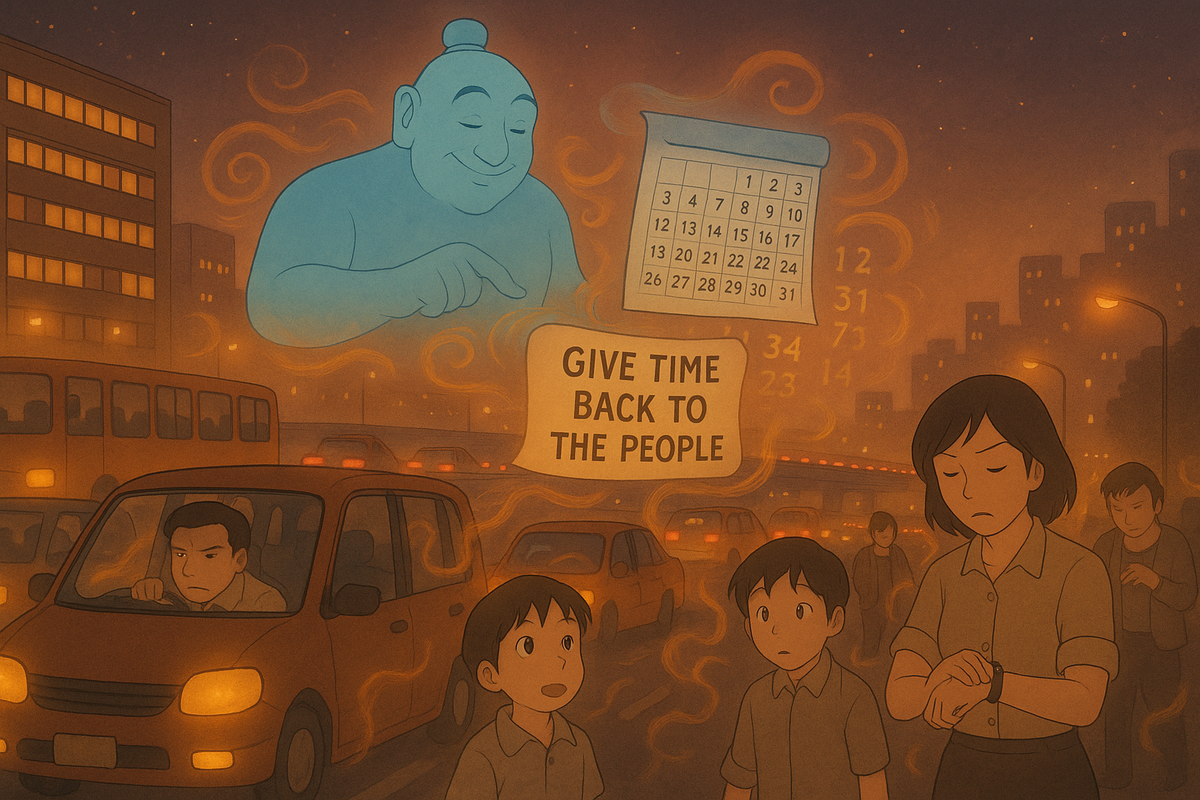Is Traffic Stealing Your Life? – India’s Commute Crisis
How much of your life is lost in traffic? Discover commute stats, health impacts, and solutions to reclaim time in Indian cities. SpotGenie’s take on time.

Discover the hidden cost of commute time in Indian cities, how it impacts energy, and what we can do to reclaim time. Narrated by SpotGenie's Genie.
Is Traffic Stealing Your Life? Analyzing Commute Times in India
🧞♂️ Greetings, time traveler — or should I say, traffic survivor? It’s me again, your SpotGenie guardian. Today, I won’t talk about parking or honking. I want to ask a simple question: How much of your life is spent just... waiting?
1. Introduction: Measuring Time in Traffic
Millions of Indians spend hours each day navigating city chaos, losing precious minutes — even hours — in transit. It’s not just a hassle; it’s a hidden thief of productivity, joy, and well-being.
Surveys by the Centre for Science and Environment show that urban Indians spend 7–10 hours weekly commuting. That’s over 500 hours a year — 20 days of life spent waiting for a green light.
It’s not just about being late. It’s about what you never had time to begin. And that’s where the real cost lies.
2. Average Commute Time by City
| City | Average Commute (One-Way) | Notable Bottlenecks |
|---|---|---|
| Bengaluru | 45–55 mins | Outer Ring Road, Silk Board Junction |
| Delhi | 40–50 mins | Gurgaon border, Ashram, Ring Road |
| Mumbai | 30–40 mins | Western Express Highway, Kurla, Andheri |
| Pune | 35–45 mins | Hinjewadi, Katraj, Nagar Road |
| Hyderabad | 30–40 mins | Gachibowli, Mehdipatnam |
3. It’s Not Just the Time, It’s the Energy
Commute time isn't just lost minutes — it’s emotional drain. Long commutes are tied to higher anxiety, lower productivity, and reduced family engagement. Every extra minute is a slow burn on attention and peace of mind.
It’s not just what traffic takes from your watch — it’s what it takes from your well-being.
4. Remote Work: A Pause or a Solution?
The pandemic gave us a break — and a realization. With work-from-home and hybrid models, people reclaimed hours. But now, as offices reopen, traffic woes return. Can we preserve what worked?
- Flexible hours = reduced peak congestion
- Home offices = better family time
- Commute-free days = higher productivity
Remote work isn’t a full fix, but it’s a compelling case study of how traffic time can be traded for living time.
5. What Can Be Done?
India needs a layered solution:
- Flexible work policies to reduce peak-hour pressure
- Metro & BRT expansion for reliable mass transit
- Cycling lanes & walkways to promote micro-mobility
- Smart traffic systems for real-time diversion
- Apps for carpooling and route optimization
Solutions exist — if we prioritize time over tradition.
6. Conclusion: Designing Cities for Time, Not Traffic
As your roadside genie, I don’t grant wishes — I whisper reminders. And the biggest one is this: time is your most precious resource. Let’s build cities that protect it, not steal it. You deserve more than survival between signals — you deserve a life between destinations.
Keywords: India commute crisis, average travel time India, traffic time lost, urban mobility India, work commute India, long commute impact, traffic stress India, daily travel time stats, SpotGenie Gyaan, hybrid work India, time-saving traffic solutions, metro expansion India, productivity loss traffic, commute fatigue urban India.
Have a question or feedback?
Message us on WhatsApp or visit www.spotgenie.in
Follow us on:
🅾 Instagram | ⓕ Facebook | 𝕏 x.com | ▶️ @SpotGenie_YT | 🤖 reddit | 🌐 spotgenie.in
⏳ More SpotGenie Gyaan on Traffic, Time, and Smarter Cities
- India’s Worst Traffic Cities – Urban Congestion Report 2025
- The Science of Honking – Understanding Urban Noise in India
- AI on the Rails – How Smart Collision Tech May Prevent the Next Disaster
- Toll Booths Out, GPS In – India’s Distance-Based Tolling Revolution
- Get SpotGenie – Save Time, Stay Notified, Drive Thoughtfully
Time is your most valuable asset. Let SpotGenie guide you through India’s traffic tangle with insight, empathy, and innovation.



